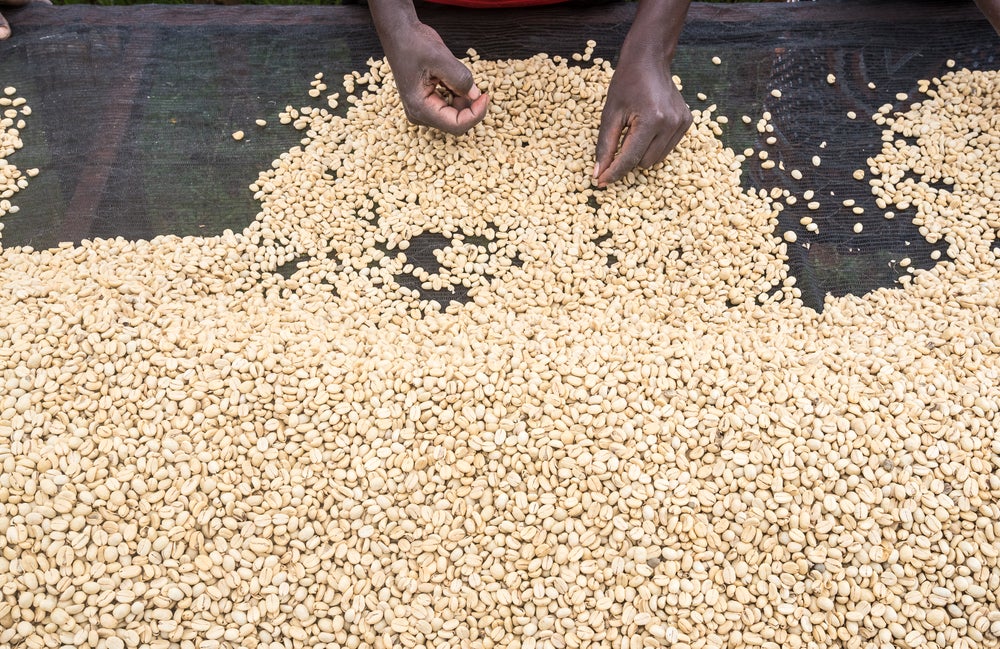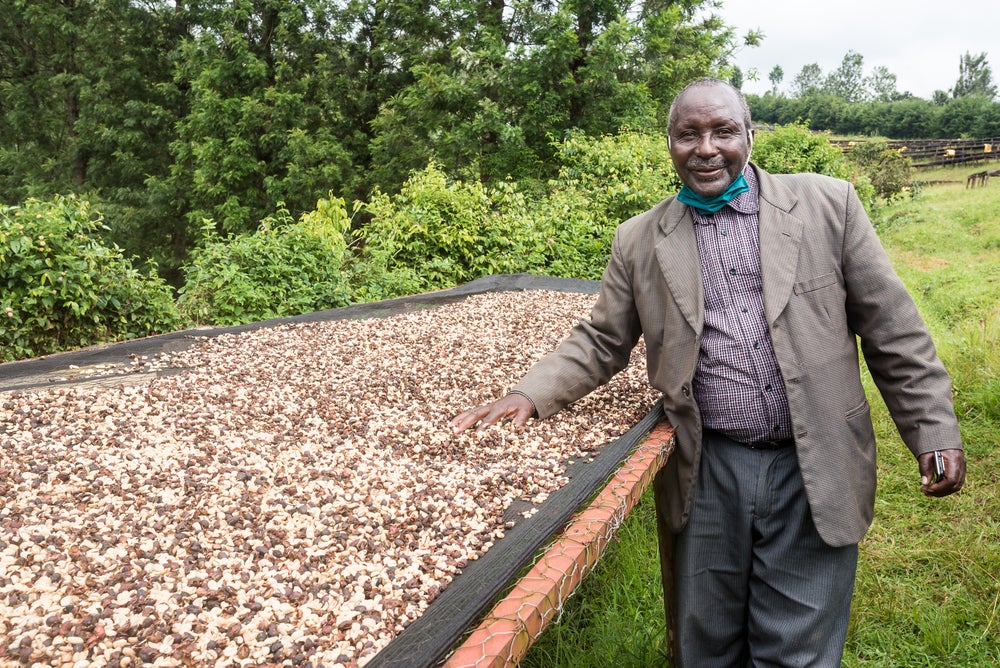About This Coffee
Gatina Washing Station sits a few kilometers outside the town of Karatina in Nyeri County. The station was built in 1968, nestled between the western slopes of Mt. Kenya and the eastern slopes of the Aberdares mountains. It is managed by Mugaga Farmers’ Cooperative Society. Today, the station receives cherry from 790 members. Of those, 280 — over 30% — are women.
Cultivation
The 790 members of Gatina station cultivate a total of 142 hectares. This breaks down to about a tenth of a hectare—or a few hundred trees—per farmer. Such small coffee ‘gardens’ makes it possible, vital even, to focus on specialty processing and increase the value per kilogram of cherry picked. Farm labor is usually entirely provided by family members, which can often make maintaining specialty cultivation and picking practices easier. Many of the farmers also grow tea, maize and legumes to consume or sell at local markets for additional cash income.
Harvest & Post-Harvest
Farmers selectively handpick ripe cherry and deliver it directly to Gatina, or one of the 4 collection points created to ease transport burdens on more distant farms. Cherry is hand sorted at intake and damaged, overripes and underripes are removed before pulping. The role of the cherry clerk, who must ensure that only the ripest cherry is processed, is of paramount importance. Farmers will not be allowed to submit sub-par cherry and must take any rejected cherry home with them to dry on beds or mats. This cherry can then be submitted at the end of the season as mbuni grade for a much lower price. In this way, farmers are incentivized to only pick cherry that is truly at its peak.
Cherry is pulped with a three-disc pulper and then fermented overnight. All water for pulping and fermentation is drawn from fresh rivers flowing from the many streams on Mt. Kenya and the Aberdares Mountains. Following fermentation, coffee is washed in clean water, soaked and spread to dry on raised drying beds. Parchment dries for 7 to 15 days. Throughout the drying process, parchment is frequently turned to promote even drying and covered during the hottest part of the day to maintain steady temperatures. Employees also inspect drying parchment and remove any damaged or discolored beans.
Once dry, parchment is delivered to Kahawa Bora Millers, one of our Sister company in Kenya. The mill has the capacity to mill smaller lots separately to help preserve quality and traceability.
Mugaga Farmers’ Cooperative Society
Mugaga Farmers’ Cooperative Society manages 5 washing stations and has over 4,800 member farmers. In addition to managing washing stations that help their members garner high prices for their coffee, Mugaga works to alleviate a number of barriers to success that frequently thwart their members.
Many members have low yields due to a combination of a lack of inputs, older rootstock and attacks from pests and disease. Mugaga provides resources to help member farmers improve yields. They also have programs that focus on increasing participation among young people and women in coffee. As we can see from their numbers, they have been very successful so far. A full third of their members are women, which is especially impressive when compared to many other cooperative gender ratios.
AA Grade
Kenyan coffees are classified by size. AA beans are the largest size. AA grade coffees are those that are 17/18 screen size, meaning that they are larger than 7.2 millimeters.
Coffee in Kenya
Though coffee growing had a relatively late start in Kenya, the industry has gained and maintained a impressive reputation. Since the start of production, Kenyan coffee has been recognized for its high-quality, meticulous preparation and exquisite flavors. Our in-country sister company, Sucafina Kenya, works with farmers across the country to ensure these exceptional coffees gain the accolades they deserve.
Today, more than 600,000 smallholders farming fewer than 5 acres compose 99% of the coffee farming population of Kenya. Their farms cover more than 75% of total coffee growing land and produce nearly 70% of the country’s coffee. These farmers are organized into hundreds of Farmer Cooperative Societies (FCS), all of which operate at least one factory. The remainder of annual production is grown and processed by small, medium and large land estates. Most of the larger estates have their own washing stations.
Most Kenyan coffees are fully washed and dried on raised beds. The country still upholds its reputation for high quality and attention to detail at its many washing stations. The best factories employ stringent sorting practices at cherry intake, and many of them have had the same management staff in place for years.

